| Srl | Item |
| 1 |
ID:
163124
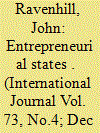

|
|
|
|
|
| Summary/Abstract |
The emergence of newly prominent participants (NPPs) in global governance has led to a revival of scholarly interest in the concept of middle powers. Because NPPs do not share the characteristics of “classical” middle powers, analysts have attempted to salvage the concept by adding various qualifiers. In doing so, they have further reduced its analytical utility. The concept of “entrepreneurial” states extracts the valuable components of the literature on middle powers while avoiding the problems arising from the conflation of two elements of behaviour—strategic and purposive. Entrepreneurial states are countries that seek to gain the support of others in pursuit of their perceived interests in the international system. They may be supporters of the current system, or seek to change it fundamentally. We investigate what attributes are necessary for states to behave in an entrepreneurial manner through studies of both successful and failed attempts at policy entrepreneurship.
|
|
|
|
|
|
|
|
|
|
|
|
|
|
|
|
| 2 |
ID:
147607
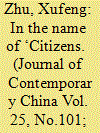

|
|
|
|
|
| Summary/Abstract |
The rise and fall of public intellectuals in contemporary China is essentially attributed to the ever changing state–society relations. The author demonstrates that some Chinese public intellectuals have developed a new strategy to promote policy changes in the Hu–Wen era through civic activism in the name of ordinary citizens, by abandoning their traditional capacity as experts or intellectuals. The article summarizes three specific actions of civic activism, namely, ‘petition for constitutionality review as citizens’, ‘provisional voluntary citizen groups’ and ‘netizen public welfare enterprises’. Cases have been studied to demonstrate that the policy entrepreneurship of public intellectuals in civic activism can be manifested as innovation and strategies that challenge the lacunae between policy and existing institutions.
|
|
|
|
|
|
|
|
|
|
|
|
|
|
|
|
| 3 |
ID:
158028
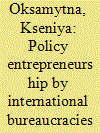

|
|
|
|
|
| Summary/Abstract |
The UN Secretariat’s role in the expansion of peacekeeping after the cold war is debated. Different theoretical accounts offer competing interpretations: principal–agent models and sociological institutionalism tend to emphasize the Secretariat’s risk-averse behaviour; organizational learning scholarship and international political sociology find evidence of the Secretariat’s activism; constructivism analyses instances of both. I argue that the UN Secretariat can be both enthusiastic and cautious about new tasks depending on the circumstances and the issue area. For example, UN officials have been the driving force behind the development of public information campaigns by peacekeeping missions aimed at the local population. During the cold war, it was not regarded as necessary for UN missions to communicate with the public in the area of operation: their interlocutors were parties to the conflict and the diplomatic community. With the deployment of the first multidimensional missions in the late 1980s and the early 1990s, UN staff realized the need to explain the organization’s role to the local population and provide information about UN-supported elections. In promoting this innovation, they played the role of policy entrepreneurs. The institutionalization of this innovation, however, was not an automatic process and required continuous advocacy by UN information staff.
|
|
|
|
|
|
|
|
|
|
|
|
|
|
|
|
| 4 |
ID:
124289
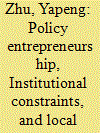

|
|
|
|
|
| Publication |
2013.
|
| Summary/Abstract |
Policy entrepreneurship has been a key concept to explain policy dynamics and policy changes. Despite considerable debate on the role of policy entrepreneurs in the policy making process, insufficient effort has been put forth on motivations of policy entrepreneurs and interactions between policy entrepreneurs and other key players in different settings. This article explores the role of policy entrepreneurship in local policy process in a transitional society, China, with special reference to housing reform experience in Guizhou Province. It argues that value, knowledge, and tactics such as framing are crucial for policy
|
|
|
|
|
|
|
|
|
|
|
|
|
|
|
|
| 5 |
ID:
121314
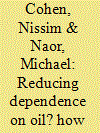

|
|
|
|
|
| Publication |
2013.
|
| Summary/Abstract |
Policy entrepreneurs are individuals who exploit an opportunity in order to influence political results for their own benefit. We use the policy entrepreneurship literature as a theoretical lens for understanding how local players in the policy arena can use a national security agenda in order to promote an energy policy they desire. Using a case study approach, we explain how an Israeli electric vehicle company, Better Place, identified Israel's acute national security priority to cut its dependence on oil and leveraged it, along with environmental arguments, to make the case for their approach to transportation. Our analysis also demonstrates how policy entrepreneurs collaborate with Israeli bureaucrats, senior politicians and lobbying groups to create a national shift toward electric cars.
|
|
|
|
|
|
|
|
|
|
|
|
|
|
|
|